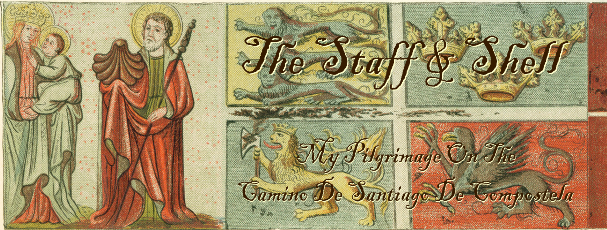Welcome Family & Friends
“Never lose an opportunity of seeing anything that is beautiful; for beauty is God's handwriting ~ a wayside sacrament. Welcome it in every fair face, in every fair sky, in every fair flower, and thank God for it as a cup of blessing."
~ Ralph Waldo Emerson
Last year as I was contemplating my 40th year on this big blue planet, that I have not seen nearly enough of, I thought that it was time to set some firm goals for myself rather than constantly saying “Wouldn’t it be nice to one day…”. Instead of having another blowout birthday bash, I have decided to opt for something a little more introspective. So, that’s it. 2011 is the year I’m doing my Pilgrimage on The Camino De Santiago De Compostela.
Why have I waited so long? Well to be truthful, I really had not heard about it until recently. I actually happened upon the idea watching an episode of "Burt Wolf's Travels & Traditions" on PBS one weekend. Then there's also the finances associated with such a long journey rife with logistics. This endeavor isn’t going to be cheap when you add up plane fare, hiking equipment, 50 euros a day, and time off from work. But my plans are slowly materializing. It’s going to happen - I can see it! I've even asked my friends and family to keep me to my word on this one. I plan on starting my trek in late September during the less congested season. If all goes well, I should end my journey close to the end of October 2011!
I created this blog to keep you all informed on my progress in the months leading up to my trip. This blog will give me a forum to educate everyone about the Pilgrimage and its history...and even comment on the French and Spanish cultures. I also plan on doing a lot of fundraising to help me pay for things I will need, so check back often as I announce events and opportunities for you to help me reach my goals. Speaking of goals, I will also be doing a lot of physical training to ready my body for the long walk. I will be sure to post all my trials and tribulations here as well. I know a lot of you will get a kick out of hearing how I "get back into shape" over the next few months. Please don't hold back if you have any tips that will aid in my fitness.
I will also utilize this blog to diary and chronicle my days while on the Pilgrimage. It will be my main mode of communication since I will be all the way in Spain. I will try and post daily musings of my travels, send out pretty pictures of the contryside, and tell you about all the wonderful people I encounter along the way. My path will take me across 350+ miles of beautiful landscapes starting near the Pyrenees and traversing all the way out to the Galician coast. I’m figuring on 4-5 weeks to reach the Cathedral where the remains of Saint James The Greater rest - I know, can you believe it?!!!
So thanks for visiting my blog! Please come by and poke around as I send out future updates and please spread the word - I want to share this story with everyone and anyone that is willing to listen and learn!
"What lies behind us and what lies before us are tiny matters compared to what lies within us."
Love Always,
Richert Gordon
"Remember that you are dust, and to dust you shall return."

The Wednesday after Quinquagesima Sunday, which is the first day of the Lenten fast. The name dies cinerum (day of ashes) which it bears in the Roman Missal is found in the earliest existing copies of the Gregorian Sacramentary and probably dates from at least the eighth century. On this day all the faithful according to ancient custom are exhorted to approach the altar before the beginning of Mass, and there the priest, dipping his thumb into ashes previously blessed, marks the forehead - or in case of clerics upon the place of the tonsure - of each the sign of the cross, saying the words: "Remember man that thou art dust and unto dust thou shalt return." The ashes used in this ceremony are made by burning the remains of the palms blessed on the Palm Sunday of the previous year. In the blessing of the ashes four prayers are used, all of them ancient. The ashes are sprinkled with holy water and fumigated with incense. The celebrant himself, be he bishop or cardinal, receives, either standing or seated, the ashes from some other priest, usually the highest in dignity of those present. In earlier ages a penitential procession often followed the rite of the distribution of the ashes, but this is not now prescribed.
There can be no doubt that the custom of distributing the ashes to all the faithful arose from a devotional imitation of the practice observed in the case of public penitents. But this devotional usage, the reception of a sacramental which is full of the symbolism of penance (cf. the cor contritum quasi cinis of the "Dies Irae") is of earlier date than was formerly supposed. It is mentioned as of general observance for both clerics and faithful in the Synod of Beneventum, 1091 (Mansi, XX, 739), but nearly a hundred years earlier than this the Anglo-Saxon homilist Ælfric assumes that it applies to all classes of men. "We read", he says, in the books both in the Old Law and in the New that the men who repented of their sins bestrewed themselves with ashes and clothed their bodies with sackcloth. Now let us do this little at the beginning of our Lent that we strew ashes upon our heads to signify that we ought to repent of our sins during the Lenten fast.
And then he enforces this recommendation by the terrible example of a man who refused to go to church for the ashes on Ash Wednesday and who a few days after was accidentally killed in a boar hunt (Ælfric, Lives of Saints, ed. Skeat, I, 262-266). It is possible that the notion of penance which was suggested by the rite of Ash Wednesday was was reinforced by the figurative exclusion from the sacred mysteries symbolized by the hanging of the Lenten veil before the sanctuary. But on this and the practice of beginning the fast on Ash Wednesday.
In the Roman Catholic Church, ashes, being sacramentals, may be given to any Christian, as opposed to Catholic sacraments, which are generally reserved for church members, except in cases of grave necessity. Similarly, in most other Christian denominations ashes may be received by all who profess the Christian faith and are baptized.
In the Roman Catholic Church, Ash Wednesday is observed by fasting, abstinence from meat, and repentance - a day of contemplating one's transgressions. The Anglican Book of Common Prayer also designates Ash Wednesday as a day of fasting. In other Christian denominations these practices are optional, with the main focus being on repentance. On Ash Wednesday and Good Friday, Roman Catholics between the ages of 18 and 59 are permitted to consume only one full meal, which may be supplemented by two smaller meals, which together should not equal the full meal. Some Roman Catholics will go beyond the minimum obligations demanded by the Church and undertake a complete fast or a bread and water fast. Ash Wednesday and Good Friday are also days of abstinence from meat (for those Catholics age 14 and over), as are all Fridays in Lent. Some Roman Catholics continue fasting during the whole of Lent, as was the Church's traditional requirement, concluding only after the celebration of the Easter Vigil.































No comments:
Post a Comment